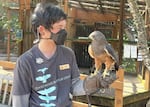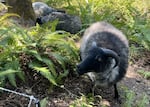
Taka, right, is a Swainson's Hawk, and one of the trained residents at the Cascades Raptor Center.
Nathan Wilk / KLCC
With wildfire season well underway, the Cascades Raptor Center near Eugene, Oregon, said it’s prepared in case a blaze ever threatens its facilities.
The animal sanctuary is in a forested area just south of Eugene. It’s home to a wildlife hospital, and 33 resident raptors.
At a picnic table at the Center, Bird Curator Kit Lacy sat with a thick white binder, which contains the sanctuary’s emergency action plan.
“We’re not just kind of waiting around for a fire to take us down,” said Lacy. “We also have been really proactive in trying to make our site itself is fire safe.”
Lacy said three sheep continuously graze the site, clearing away brush that could become wildfire fuel. She also said buildings also have metal roofing to prevent damage.
If the Center has to evacuate, Lacy said the resident raptors are trained to enter their travel crates voluntarily. She said moving the hospitalized birds may be harder, but staff members are qualified to quickly capture and restrain them.
“It helps me sleep at night to know that we have this plan in place,” said Lacy.
Earlier this month, the Greenhill Humane Society had to evacuate due to a rapidly spreading brush fire in West Eugene. The animals were safely returned the same day.
There are no wildfires currently threatening the Eugene area, but temperatures are expected to climb into the 90s Fahrenheit this week.

A sheep grazes at the Cascades Raptor Center.
Nathan Wilk / KLCC
On hotter days, Lacy said more wild birds may face heat-related health issues. In previous heatwaves, she said the Center saw soaring admissions to its hospital.
“Young birds that haven’t fledged their nests yet basically start to overheat,” said Lacy. “And it’s untenable. And even though they can’t fly, they jump and they leave their nests.”
However, Lacy said not all young-looking birds actually need help. She said the public should always call before removing an animal from its habitat.